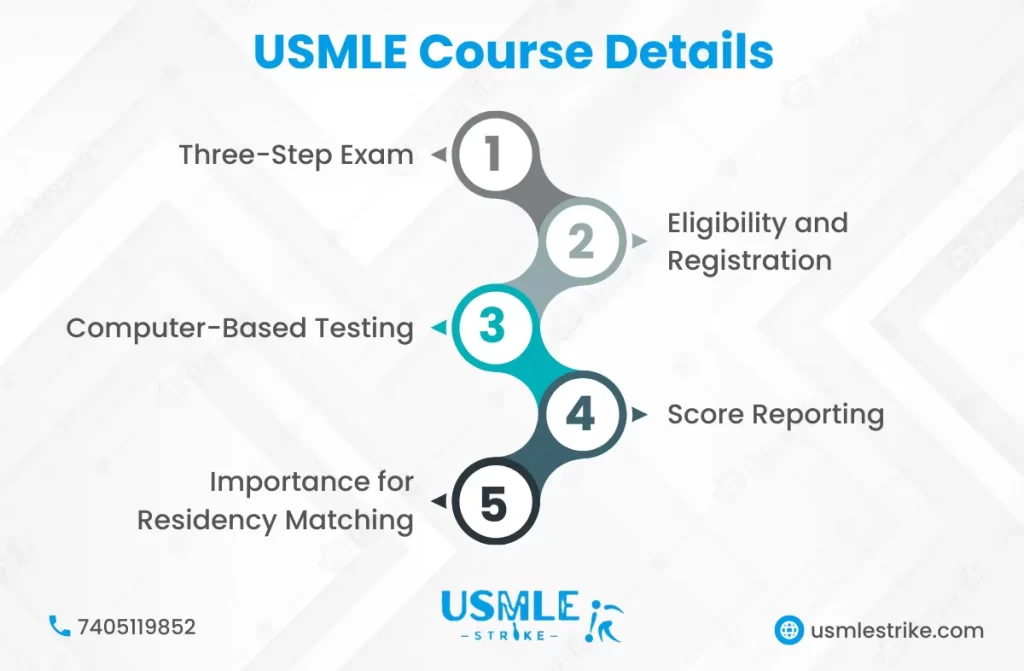The USMLE exam pattern is one of the most important things you must understand before beginning your preparation. The United States Medical Licensing Examination (USMLE) is a three-step process that tests your medical knowledge and clinical decision-making skills.
If you are planning to take the exam in 2025, this guide will explain the USMLE Step 1 exam pattern, Step 2, and Step 3 in a simple and easy format.
🧾 Quick Overview of USMLE Exam Pattern 2025
| Step | Name | Focus Area | Format | Duration |
|---|---|---|---|---|
| 1 | Step 1 | Basic Science Knowledge | MCQs | 8 hours |
| 2 | Step 2 Clinical Knowledge (CK) | Clinical Knowledge & Application | MCQs | 9 hours |
| 3 | Step 3 | Clinical Decision-Making & Practice | MCQs + Case Sims | 2 days |
USMLE Step 1 Exam Pattern 2025
Step 1 focuses on basic science concepts and how they apply in clinical scenarios. It is the first step in the USMLE exam pattern and forms the base of your preparation.
🧠 Subjects Covered:
- Anatomy
- Physiology
- Biochemistry
- Pathology
- Pharmacology
- Microbiology
- Behavioral Science
📝 Format:
| Feature | Detail |
|---|---|
| Total Blocks | 7 (each block – 60 mins) |
| Questions per Block | Max 40 |
| Total Questions | Around 280 |
| Exam Duration | 8 hours (with breaks) |
✅ Tip:
Study from First Aid and practice using UWorld. If you want a full guided study plan, check out our USMLE Strike Step 1 course – built for students who want a clear path to success.
Step 2 Clinical Knowledge (CK) – USMLE Exam Pattern
Step 2 CK tests your clinical knowledge and your ability to apply it in real-life medical scenarios. It is a crucial part of the usmle exam pattern that assesses how well you treat and manage patients.
📚 Subjects:
- Internal Medicine
- Pediatrics
- Psychiatry
- Surgery
- OB-GYN
- Preventive Medicine
📝 Format:
| Feature | Detail |
|---|---|
| Total Blocks | 8 (each block – 60 mins) |
| Questions per Block | Around 40 |
| Total Questions | About 318 |
| Exam Duration | 9 hours (with breaks) |
✅ Tip:
Use case-based materials like Master the Boards. For extra support, our USMLE Strike course includes live sessions, doubt-clearing, and mock tests to boost your preparation.
Step 3 – Final Stage of the USMLE Exam Pattern
USMLE Step 3 is the final and most advanced step. It is spread across two days and includes both MCQs and interactive patient cases called CCS (Computer-based Case Simulations).
📅 Day-wise Format:
| Day | Focus | Format | Duration |
|---|---|---|---|
| Day 1 | Foundations of Independent Practice | 232 MCQs | 7 hours |
| Day 2 | Advanced Clinical Medicine | 180 MCQs + 13 CCS cases | 9 hours |
✅ Tip:
Focus on time management and clinical logic. Join the USMLE Strike Step 3 course which includes real CCS practice, full mentorship, and feedback sessions.
📌 USMLE 2025 Exam Pattern Summary Table
| Step | Type | Total Questions | Duration | Format |
|---|---|---|---|---|
| Step 1 | Basic Sciences | ~280 | 8 hours | MCQs |
| Step 2 | Clinical Knowledge | ~318 | 9 hours | MCQs |
| Step 3 | Clinical Judgment | ~412 + 13 CCS | 2 Days | MCQs + Case Simulations |
USMLE Strike – The Best Course for All 3 Steps
If you’re confused about where to start, USMLE Strike is the right place for you.
🎯 Why Choose USMLE Strike?
- ✅ Live & Recorded Sessions
- ✅ Indian-friendly curriculum
- ✅ CCS Case Practice & Mock Exams
- ✅ Personalized mentoring
- ✅ Affordable Pricing
We’ve helped hundreds of students pass all 3 steps on the first attempt.
🗣️ What Students Say (From Our Google Reviews)
⭐⭐⭐⭐⭐
“USMLE Strike guided me step-by-step through the entire journey. The Step 1 course was super clear and easy to follow!” – Dr. Sahana
⭐⭐⭐⭐⭐
“I was scared about Step 3, especially the CCS cases, but the USMLE Strike course made it so simple.” – Dr. Karthik

✅ Preparation Tips for USMLE 2025
Here are a few key strategies to help you master the usmle exam pattern:
- 📌 Start early and plan each step
- 📌 Use quality resources like UWorld and NBME
- 📌 Take full-length practice exams
- 📌 Track your progress weekly
- 📌 Consider enrolling in a trusted course like USMLE Strike
📖 Final Words
Understanding the usmle exam pattern is the first step toward your dream medical career. Whether you’re preparing for Step 1, Step 2, or Step 3 – having a solid plan makes all the difference.
And remember – with the right guidance, success is just one step away.
👉 Join USMLE Strike today and get expert mentorship to clear all 3 steps with confidence!





